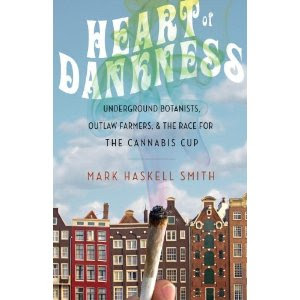Book Review: Heart of Dankness
Heart of Dankness
Signal Books
This review is perhaps a more offbeat choice for me not only to read but to share. Enjoy!
Mark Haskell Smith, screenwriter of Playing God (1997), author of playful thrills in fiction, such as “Baked” (2010), essayist for the Los Angeles Times, a television writer, playwright, and now his extensive writing talent can also include an arresting non-fiction novel, “Heart of Dankness”. Smith’s book strips away the blemished history of the cannabis plant and reveals, with a witty and iconographic tone, the contemporary business of growing, consuming and ways of celebrating this ancient herb.
In this culmination of informative cannabis history, familiar stereotypes and artisanal botany, Smith searches for the true meaning of dank after experiencing an enlightening high at Amsterdam’s yearly Cannabis Cup. Dank, as described by Smith is “some connoisseur-quality cannabis” that I guarantee you did not experienced in high school (7). From there, a passion is ignited as he searches for more dank cannabis and the spirited artisans behind the best of the best. Smith quickly accesses a medicinal marijuana pass by paying a visit to a certified gynecologist in an abandoned office building. This process is only just being discovered by the British Columbia media as of now with recent coverage of doctors who are taking advantage of patients by charging upwards of one thousand Canadian dollars to acquire a cannabis prescription. Although there are definite holes within both the Californian and Canadian process of providing prescriptions Smith points out the encouraging developments within the dispensary and legalization of quality products. One example is the Berkeley Patients Group dispensary run by activist Debby Goldsberry and her crew striving to make their establishment as professional as possible in order to be taken seriously by the Government. Smith notices the difference between Berkeley and the dispensaries of Los Angeles, “I was surprised by the vocabulary that Debby...used. Not once did I hear the words ‘pot‘ or ‘weed.‘ The plant was called ‘medicine‘ or ‘cannabis’...They are making a determined effort to change the language, to alter the discourse...if the language changes, maybe the culture changes too” (133).
Upon first hearing of Mark Haskell Smith’s book I had figured that he would be intermingling with the most dangerous of characters belonging to the cartel. Rather, the subpar drugs the cartel produce do not belong in the Cannabis Cup, the quality suffers as they are all about making money and not making quality dank weed. The growers that Smith does encounter and befriend pour their personal funds, time and hearts into creating unique combinations that not only provide a positive high but also taste and look good in an organic way. Smith reveals, “like a classic French vintner, Crocket, [a passionate grower from California], believes in the concept of terroir, the idea that the land and location where the plants live - the climate, soil, and peculiarities of geography - have a huge influence on the quality of the end product. ‘You can tell if something’s been grown in the mountains. You can taste it’ [Crocket explained]” (102).
The reader is never discouraged by the heavy jargon of science and process of growing because of Smith’s witty and humorous writing. For example, Smith attends the Treating Yourself Medical Marijuana and Hemp Expo in Toronto. Smith encounters the surreal quality of Canadian culture after smoking a dank satvia strain called Chocolope known for its chocolate flavour; “Lake Ontario stretched out to the horizon, reflecting the sunset...I was walking up Blue Jays Way...when I suddenly realized that something was wrong. Very wrong. I stopped and looked at the people on the street and realized that almost everyone was wearing a Rush T-shirt. It was like that moment in a zombie movie when the hero recognizes that things have changed” (164). He was witnessing a conglomeration of Rush fans making a pilgrimage to the site of a popular ritual known as a concert.
Smith conveys the unique atmosphere of Amsterdam during the Cannabis Cup of 2010 where his book comes to a head showing how the hard work of the artisan may or may not pay off. The prize is invaluable with magazine coverage, increased popularity and millions of dollars/euros as a result. I can’t say how often I have read travel blogs and watched travel shows (save for Anthony Bourdain) that feature Amsterdam and completely avoid mentioning the cafes and the quality of herb that they may have experienced during their stay. It is unfortunate and proof of the stigma that surrounds cannabis within the North American culture.
Mark Haskell Smith’s “Heart of Dankness” ultimately shatters the typical stereotypes of stoners and reveals the business of growing from the heart and some of the various people who consume or support the herb turn out to be businessmen, educated scientists, politicians, parents and construction workers. Smith’s book helps erase the stigma and negativity by revealing the history and contemporary faces working behind the scenes. Smith reveals that the true crime isn’t smoking or growing cannabis but having the plant illegal which only helps the cartel. If only North America would legalize it the national debt of both Canada and the United States of America could help become diminished. However, we first need to open conversation and potentially “change the discourse”.
Thank you to Mark Haskell Smith and Signal Books for providing me with a copy prior to the release date.
Murissa Shalapata writes a food and travel blog, The Wanderfull Traveler, and writes about her culinary adventures for Vecu Magazine, an online publication. She is newly graduated with a double major in art history and creative writing. She is currently working on her first novel in the Okanagan Valley of BC.


Comments
Post a Comment
We would love to hear from you but hope you are a real person and not a spammer. :)